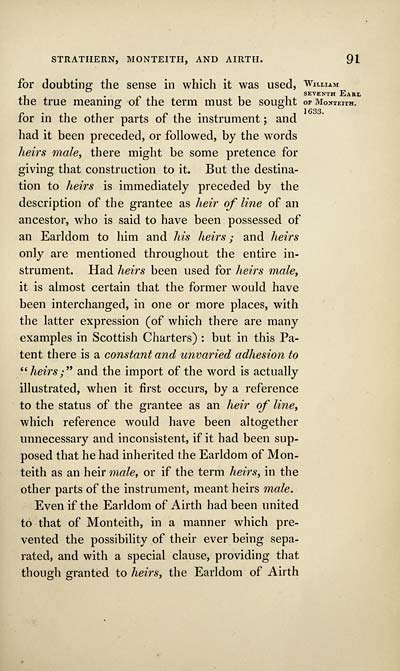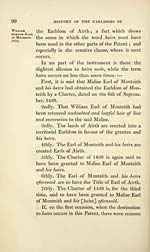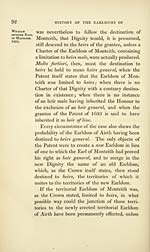Download files
Complete book:
Individual page:
Thumbnail gallery: Grid view | List view

STRATHERN, MONTEITH, AND AIRTH. 91
for doubting the sense in which it was used, William
, • r> 1 SEVENTH EaBL
the true meaning of the term must be sought ofMoxteith.
for in the other parts of the instrument ; and
had it been preceded, or followed, by the words
heirs male, there might be some pretence for
giving that construction to it. But the destina-
tion to heij's is immediately preceded by the
description of the grantee as hei?' of line of an
ancestor, who is said to have been possessed of
an Earldom to him and his heirs ; and heirs
only are mentioned throughout the entire in-
strument. Had heirs been used for heirs male,
it is almost certain that the former would have
been interchanged, in one or more places, with
the latter expression (of which there are many
examples in Scottish Charters) : but in this Pa-
tent there is a constant and unvaried adhesion to
*' heirs ;** and the import of the word is actually
illustrated, when it first occurs, by a reference
to the status of the grantee as an heir of line,
which reference would have been altogether
unnecessary and inconsistent, if it had been sup-
posed that he had inherited the Earldom of Mon-
teith as an heir male, or if the term heirs, in the
other parts of the instrument, meant heirs male.
Even if the Earldom of Airth had been united
to that of Monteith, in a manner which pre-
vented the possibility of their ever being sepa-
rated, and with a special clause, providing that
though granted to heirs, the Earldom of Airth
for doubting the sense in which it was used, William
, • r> 1 SEVENTH EaBL
the true meaning of the term must be sought ofMoxteith.
for in the other parts of the instrument ; and
had it been preceded, or followed, by the words
heirs male, there might be some pretence for
giving that construction to it. But the destina-
tion to heij's is immediately preceded by the
description of the grantee as hei?' of line of an
ancestor, who is said to have been possessed of
an Earldom to him and his heirs ; and heirs
only are mentioned throughout the entire in-
strument. Had heirs been used for heirs male,
it is almost certain that the former would have
been interchanged, in one or more places, with
the latter expression (of which there are many
examples in Scottish Charters) : but in this Pa-
tent there is a constant and unvaried adhesion to
*' heirs ;** and the import of the word is actually
illustrated, when it first occurs, by a reference
to the status of the grantee as an heir of line,
which reference would have been altogether
unnecessary and inconsistent, if it had been sup-
posed that he had inherited the Earldom of Mon-
teith as an heir male, or if the term heirs, in the
other parts of the instrument, meant heirs male.
Even if the Earldom of Airth had been united
to that of Monteith, in a manner which pre-
vented the possibility of their ever being sepa-
rated, and with a special clause, providing that
though granted to heirs, the Earldom of Airth
Set display mode to:
![]() Universal Viewer |
Universal Viewer | ![]() Mirador |
Large image | Transcription
Mirador |
Large image | Transcription
Images and transcriptions on this page, including medium image downloads, may be used under the Creative Commons Attribution 4.0 International Licence unless otherwise stated. ![]()
| Histories of Scottish families > History of the earldoms of Strathern, Monteith, and Airth > (119) Page 91 |
|---|
| Permanent URL | https://digital.nls.uk/94881270 |
|---|
| Description | A selection of almost 400 printed items relating to the history of Scottish families, mostly dating from the 19th and early 20th centuries. Includes memoirs, genealogies and clan histories, with a few produced by emigrant families. The earliest family history goes back to AD 916. |
|---|

